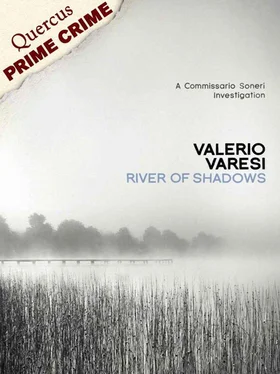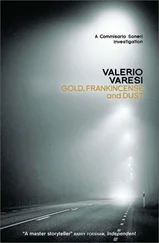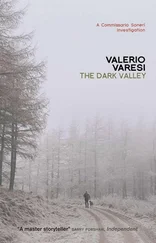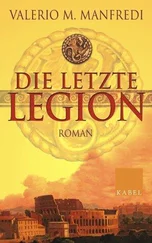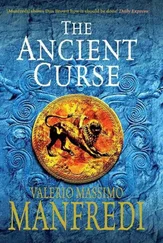Valerio Varesi - River of Shadows
Здесь есть возможность читать онлайн «Valerio Varesi - River of Shadows» весь текст электронной книги совершенно бесплатно (целиком полную версию без сокращений). В некоторых случаях можно слушать аудио, скачать через торрент в формате fb2 и присутствует краткое содержание. Жанр: Полицейский детектив, на английском языке. Описание произведения, (предисловие) а так же отзывы посетителей доступны на портале библиотеки ЛибКат.
- Название:River of Shadows
- Автор:
- Жанр:
- Год:неизвестен
- ISBN:нет данных
- Рейтинг книги:5 / 5. Голосов: 1
-
Избранное:Добавить в избранное
- Отзывы:
-
Ваша оценка:
- 100
- 1
- 2
- 3
- 4
- 5
River of Shadows: краткое содержание, описание и аннотация
Предлагаем к чтению аннотацию, описание, краткое содержание или предисловие (зависит от того, что написал сам автор книги «River of Shadows»). Если вы не нашли необходимую информацию о книге — напишите в комментариях, мы постараемся отыскать её.
River of Shadows — читать онлайн бесплатно полную книгу (весь текст) целиком
Ниже представлен текст книги, разбитый по страницам. Система сохранения места последней прочитанной страницы, позволяет с удобством читать онлайн бесплатно книгу «River of Shadows», без необходимости каждый раз заново искать на чём Вы остановились. Поставьте закладку, и сможете в любой момент перейти на страницу, на которой закончили чтение.
Интервал:
Закладка:
He took a few steps and turned back to look once again at those windows which seemed to him like the staring eyes of a corpse. He was still puzzling over that peculiarity when he realized he had reached his own car parked in front of the Italia, and he understood. Melegari had not gone home. When they disembarked from the magano, they had been convinced they would find the town deserted. The two men had left their friend in the cottage, but they had then noticed the commissario’s car which was easily visible from the elevated roadway. At that point, Melegari and his friend must have suspected something was up and had not come back to their houses — an old precaution from their activist days when they had clashes with the police.
Once home, he managed only a couple of hours’ sleep. All he felt was a kind of grim determination. The light of the late autumn dawn was as faint as at night-time, but the cold was more intense.
Things were already on the move in the town. Some lights could be glimpsed through the still-closed shutters, and shopkeepers were beginning to unload merchandise from vans. The lights were on in the newsagent’s, and as he passed, Soneri glanced at the hoardings:
MURDER ON THE PO
ANTEO TONNA KILLED BY TRAFFICKERS
He decided against buying the newspaper. He did not want to begin the day in low spirits.
He parked in an out-of-the-way spot and walked towards the jetty. He climbed over the embankment and came back down into the yard. Over the water, the clear glow of a timid dawn began to appear. He passed the cottages and walked straight over to the moorings. The space occupied by the magano was empty and the hawsers had been thrown on to the coping stones as on the day before. The commissario was disappointed and even duped, but at least he knew that the men sensed they were being watched. They had accepted their parts and were performing their assigned roles.
He wandered among the cottages, his path taking him along the avenue between on one side the entrances to the dwellings and on the other the slope at the bottom of which the river flowed. In the ashen light, he gazed at various constructions which had been thrown together with cheap, leftover materials, strange pieces of architecture with the common feature that they were all built on stilts to keep them above the water. All around lay old boats, wheels of farm carts and barbecues for the summer. He examined them one by one until he came to a detail which attracted his attention: two footsteps imprinted on the thin layer of hoar frost which had settled the night before on the avenue alongside one of those raised dwellings, footsteps which stopped abruptly near the road.
The commissario reflected on this and when he looked up at the embankment he noticed that the cottage was one of those which was invisible from where he had been standing the evening before. He went back to examine more closely those solitary footprints which came to a stop at an invisible wall. He walked along the path and climbed the steps to the upper level. A covered balcony ran round the perimeter of the dwelling, and from there on a summer evening, provided the observer used a good insecticide, the view of the Po must have had a certain charm. He tried to peer between the cracks in the shutters, but he could see only darkness within. However, he felt a draught coming from somewhere, a sign that the windows had not been closed.
It was not difficult to undo the catch. As he had anticipated, he saw before him a room where the plants had been brought in to shelter them from the frost, an oleander, geraniums and a lemon bush half covered in cellophane. The commissario breathed in the dust-filled air, while spiders’ webs clung to his face. He opened the door in the room and found himself in a corridor. His torch lit up a row of boots and a single shelf above which there was a mirror. He pressed the light switch and there appeared walls abandoned to the damp, with various doors opening off them. The one directly facing Soneri led into a kitchen which contained everything needed to prepare a meal. A calendar open at the month of September was hanging from a hook, and on the other side there were doors giving on to first a bathroom and then two bedrooms, one of which contained a perfectly made double bed which gave off an odour of camphor, while in the centre of the second stood a camp bed and beside it an electric heater.
Soneri approached the heater with all the caution of a bomb-disposal expert. It was still plugged in, but it was switched off. It was warmer in that room and everything led him to suppose that it had been occupied until a short time before, but the occupant could not have slept for long, four or five hours at the most. He examined every corner of the room. There were no more than odds and ends, a few things left over from the summer, a couple of magazines and assorted objects stuffed into a cupboard without order or neatness. Only one thing appeared to have been left there recently, a box of pills for high blood pressure. He opened it, but there was nothing inside.
He went back into the corridor and saw that the exit had been closed but not bolted. Whoever had gone out last had simply pulled the door to behind him, as did Soneri. He closed the shutters from the inside of the room with the plants and went out through the main door. When he was at the bottom of the stairs, he made his way towards the road by the shortest path, but it was then that he came across the footprints once more. If he were to continue in the same direction, he was bound to leave his own prints, because the wind had caused the hoar frost to cover the pathway. Unthinkingly, he had done what the person in the house the night before had done, but whoever it was must have noticed he was leaving traces and had turned back on his steps, picking his way between the stilts beneath the house towards a point in the driveway untouched by the hoar frost. But in the dark he had failed to notice a couple of footprints.
On the street, Soneri lit his cigar and tried to put these facts into some kind of order. Someone was living in hiding here but had been able to move about the Po with the complicity of a circle of orthodox communists who had remained faithful to Stalin. All this after the murder of two old Fascists. It might still have been 1946…
From the yard he noticed the figure of Barigazzi going down to check the stakes. He followed the old man as he set about his work. When he came up behind him, Barigazzi spun round and stared at him, a quizzical expression on his face.
“If it goes on like this,” Soneri said, pointing to the water, “even the fish are going to have a hard job of it.”
“The water is very low,” Barigazzi said, as though he had expected a different kind of question.
They walked along, leaving footprints side by side in the muddy sand just above the waterline.
“Whose is the third cottage along from the mooring berths?”
“It’s Vaeven’s,” he said with a sigh that conceded he had known the commissario would get to that point.
They went back up towards the beacon. Soneri patiently followed Barigazzi who seemed in a state of resignation. The partisans, like the Kite in those days in 1944, must have walked in the same way as they were led to the wall. When they reached the front of the boat club, the old man walked straight ahead up to the elevated roadway. The commissario caught up with him, both still lost in their own thoughts.
When they were in sight of the monument, Barigazzi stopped and turned to Soneri, evidently angry. “Look, I’ve got nothing to do with them. To my mind they’re all mad, with Stalin and all those meetings
…”
“Stalin has nothing to do with it. They’re threatening you because of the registers,” Soneri said after a brief pause.
Читать дальшеИнтервал:
Закладка:
Похожие книги на «River of Shadows»
Представляем Вашему вниманию похожие книги на «River of Shadows» списком для выбора. Мы отобрали схожую по названию и смыслу литературу в надежде предоставить читателям больше вариантов отыскать новые, интересные, ещё непрочитанные произведения.
Обсуждение, отзывы о книге «River of Shadows» и просто собственные мнения читателей. Оставьте ваши комментарии, напишите, что Вы думаете о произведении, его смысле или главных героях. Укажите что конкретно понравилось, а что нет, и почему Вы так считаете.
